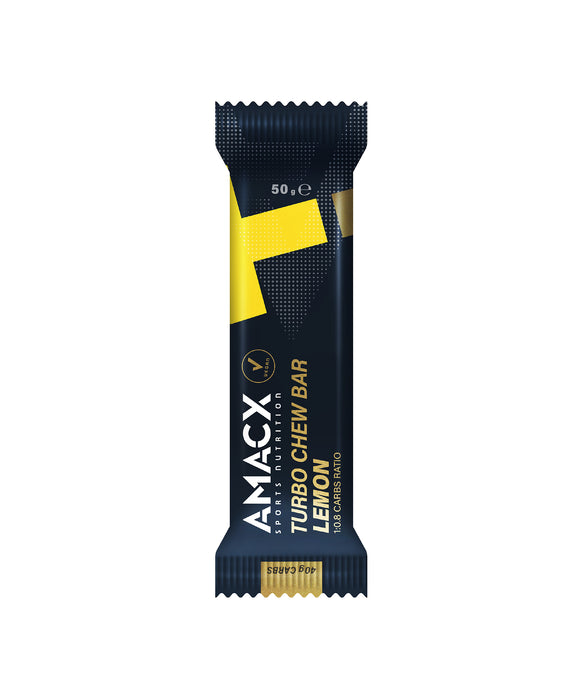
Amacx Turbo Chew Bar Lemon 12 pack
Shipping costs for orders under €50

Proper nutrition is far more than just an accessory for road cyclists. It's the fuel, the maintenance, and the repair service all in one. Riding long and intensely puts demands on your body on multiple levels — muscles, digestion, immune system, and nerves. This makes it all the more important to supply your body not just with calories, but with high-quality, functional nutrients.
Von Fabian Huber |
3 minutes read time

A topic receiving increasing attention is bitter substances – long since bred out of many modern foods, but potentially highly interesting for endurance athletes. At the same time, the question arises: How far can you get with a natural diet – and at what point do supplements become useful?
Carbohydrates are the primary source of energy, especially during endurance exercise lasting over 90 minutes. Whole-grain products, oatmeal, dates, bananas, and rice provide long-chain, stable energy.
Proteins are important for regeneration, muscle maintenance, and enzyme function. Plant sources such as legumes, quinoa, or nuts are beneficial, supplemented by high-quality animal products (eggs, yogurt, fish).
Fats, especially unsaturated fatty acids (e.g. from linseed oil, walnuts, avocado), contribute to hormonal balance and cell health.
Magnesium, iron, zinc, B vitamins, vitamin D, potassium – these and many other micronutrients are crucial for:
Muscle contraction
Oxygen transport
regeneration
immune system
People who sweat regularly lose many of these substances. Replenishing them through a normal diet is possible — but not always easy.
Bitter compounds are secondary plant compounds found in vegetables, herbs, and certain fruits. They taste—as the name suggests—bitter, and have therefore been bred out of many modern varieties. They offer enormous benefits:
Stimulate digestion: by stimulating saliva, gastric juice, bile and enzymes
Improve nutrient absorption: especially with high-fat or high-protein meals
Regulate appetite: especially cravings for sugar
Support liver and detoxification
Can promote intestinal health
Where do bitter substances occur naturally?
| Groceries | Bitter substance |
|---|---|
| arugula | Glucosinolate |
| Chicory | Lactucopicrin |
| grapefruit | Naringin |
| artichoke | Cynarin |
| Ginger | Gingerols |
| dandelion | Taraxacin |
| wormwood | Absinthin |
Bitter substances are particularly worthwhile:
Before training (small dose): to stimulate digestion when struggling with mild stomach problems
After training : to support the liver in breaking down lactate and inflammatory substances
In everyday life : for the long-term optimization of appetite, insulin sensitivity and intestinal health
A varied diet with plenty of vegetables, whole grains, high-quality oils, fermented foods (e.g. sauerkraut), herbs and foods rich in bitter substances covers many needs.
Examples of meals suitable for athletes:
Breakfast before the trip: porridge with banana, nuts and cinnamon
Snacks on the go: Rice cakes with almond butter, dried fruits, homemade energy balls
Regeneration: Lentil salad with arugula, avocado and egg
Anti-inflammatory: Turmeric shot or ginger tea with lemon
Despite the best planning, gaps can still exist. Here's an overview:
| Requirement | Possible supplements | Notes |
|---|---|---|
| Endurance + Regeneration | Electrolytes, magnesium citrate, BCAA | At high sweat rate or training camps |
| immune system | Vitamin D, zinc, omega-3 | Especially in winter |
| digestion | Bitter drops, enzymes | For stomach problems or bloating |
| Iron deficiency | Iron supplements | Only after blood work! Common in women |
👉 Study: Dietary supplements and sports performance: minerals (2005)
For racing cyclists who want to improve their performance holistically, bitter substances are an often overlooked key: They improve nutrient absorption, aid digestion, stabilize appetite and can support regeneration.
At the same time, it is clear that those who pay attention to a varied, natural diet can meet many of the body's needs in a holistic way – and supplement in a targeted and sensible way, instead of relying on a "cocktail of cans."
🍃 Include at least one bitter food daily (e.g. arugula or grapefruit)
💧 Take bitter drops (e.g. from artichoke, gentian or wormwood) 15 minutes before eating
🥗 Eat colorfully and seasonally – variety is the best micronutrient booster
🧪 Have your blood work done regularly if you train intensively

Wusstest du, dass Radfahren eine der cleversten und energieeffizientesten Fortbewegungsarten ist? Ob im Alltag, beim Pendeln oder auf langen Touren – mit einem E-Bike oder Rennrad von MYVELO sparst du Energie, schonst die Umwelt und erlebst dabei puren Fahrspaß. Entdecke jetzt unseren Artikel „Warum Radfahren unschlagbar ist“ und erfahre, wie du das Maximum aus jedem Pedaltritt herausholst.

Die Lenkerbreite ist beim Rennradfahren oft eine unterschätzte Komponente – dabei hat sie direkten Einfluss auf Komfort, Aerodynamik und Kontrolle. Ob auf langen Ausfahrten, in knackigen Anstiegen oder bei wilden Abfahrten: Dein Lenker muss zu Dir passen. Doch wie findet man die richtige Lenkerbreite? Und was sind eigentlich die Unterschiede zwischen schmalen und breiten Lenkern?

Wenn es auf dem Rennrad lang, intensiv oder beides wird, zählt vor allem eines: Energie. Dabei spielt der Blutzuckerspiegel eine zentrale Rolle. Doch was hat es mit dem glykämischen Index (GI) auf sich? Und wie nutzt man dieses Wissen für besseres Fueling während dem Training?